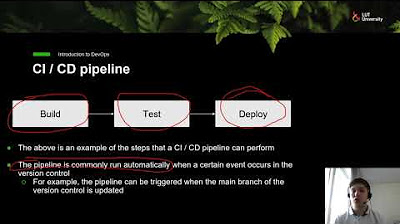Reality of 3 Crore DevOps Package | Future Roles in DevOps & AI | DevOps Pe Charcha (Hindi)
Summary
TLDRIn the 'DevOps Pe Charcha' video script, the discussion revolves around the pivotal role of DevOps in streamlining software development and operations. It highlights the importance of collaboration, automation, and continuous integration to enhance productivity and efficiency in the tech industry. The script offers insights into best practices, challenges, and the future of DevOps, making it a valuable resource for IT professionals and enthusiasts.
Takeaways
- 📈 DevOps is a crucial aspect of modern software development, focusing on continuous integration and continuous delivery.
- 🛠️ Automation is a key element in DevOps, enabling faster and more reliable deployments.
- 🌐 DevOps promotes collaboration between development and operations teams, breaking down silos.
- 📊 Monitoring and logging are essential for maintaining the health and performance of applications.
- 🔄 Continuous feedback loops help teams to iterate quickly and improve processes and products.
- 💡 Infrastructure as Code (IaC) allows for the automated management of infrastructure, making it more efficient and scalable.
- 🔒 Security should be integrated into the DevOps process, ensuring that applications are secure from the start.
- 🚀 DevOps culture emphasizes experimentation and learning from failures to drive innovation.
- 📉 DevOps practices can lead to reduced downtime and faster recovery from incidents.
- 🧑🤝🧑 Building a DevOps culture requires commitment from all levels of the organization, fostering a mindset of shared responsibility.
Q & A
What is DevOps and why is it important in today's software development landscape?
-DevOps is a set of practices that combines software development (Dev) and IT operations (Ops). It aims to shorten the systems development life cycle and provide continuous delivery with high software quality. It's important because it helps organizations deliver faster, more reliable software, and respond quickly to changes in the market.
How does DevOps improve collaboration between development and operations teams?
-DevOps improves collaboration by breaking down silos and fostering a culture of shared responsibility. Through practices such as continuous integration and continuous deployment (CI/CD), automated testing, and frequent communication, teams can work together more effectively and resolve issues more quickly.
What are some common tools used in a DevOps environment?
-Common tools in a DevOps environment include Jenkins for CI/CD, Docker for containerization, Kubernetes for orchestration, Ansible for configuration management, and monitoring tools like Prometheus and Grafana.
Can you explain the concept of Continuous Integration and Continuous Deployment (CI/CD)?
-Continuous Integration (CI) is the practice of merging all developers' working copies to a shared mainline several times a day. Continuous Deployment (CD) is the practice of automatically deploying the integrated code to production. Together, CI/CD ensures that software is always in a deployable state, allowing for frequent releases.
What challenges do organizations face when implementing DevOps practices?
-Challenges include cultural resistance, lack of skilled personnel, complexity of tool integration, and maintaining security and compliance. Overcoming these challenges requires strong leadership, continuous learning, and a commitment to cultural change.
How does DevOps contribute to faster time-to-market for software products?
-DevOps contributes to faster time-to-market by automating manual processes, enabling continuous feedback, and reducing bottlenecks. This allows teams to release updates and new features more quickly and efficiently.
What is the role of automation in DevOps?
-Automation plays a critical role in DevOps by streamlining repetitive tasks, reducing human error, and increasing efficiency. It enables continuous integration, testing, and deployment, ensuring that processes are consistent and reliable.
How do monitoring and logging tools support DevOps practices?
-Monitoring and logging tools provide visibility into the performance and health of applications and infrastructure. They help teams detect issues early, understand the root cause of problems, and maintain the reliability and availability of services.
What is Infrastructure as Code (IaC) and how does it benefit DevOps?
-Infrastructure as Code (IaC) is the practice of managing and provisioning computing infrastructure through machine-readable definition files. IaC benefits DevOps by enabling consistent and repeatable infrastructure deployments, reducing manual errors, and allowing for version control of infrastructure changes.
What is the significance of a 'shift-left' approach in DevOps?
-The 'shift-left' approach in DevOps involves integrating testing and security early in the development process. This helps identify and address issues sooner, reduces the cost of fixing bugs, and ensures higher quality and more secure software releases.
Outlines

This section is available to paid users only. Please upgrade to access this part.
Upgrade NowMindmap

This section is available to paid users only. Please upgrade to access this part.
Upgrade NowKeywords

This section is available to paid users only. Please upgrade to access this part.
Upgrade NowHighlights

This section is available to paid users only. Please upgrade to access this part.
Upgrade NowTranscripts

This section is available to paid users only. Please upgrade to access this part.
Upgrade NowBrowse More Related Video

Introduction to DevOps - CI / CD

What does DevOps engineer mean to you?

What is DevOps? - DevOps explanation by WebGentle | Explained Dev

DevOps & Continuous Delivery Lifecycle Explained

The Essence of DevOps: Stages, Principles and Benefits

Is DevOps The Right Career Option To Choose In 2024? | Career Growth In DevOps | Simplilearn
5.0 / 5 (0 votes)